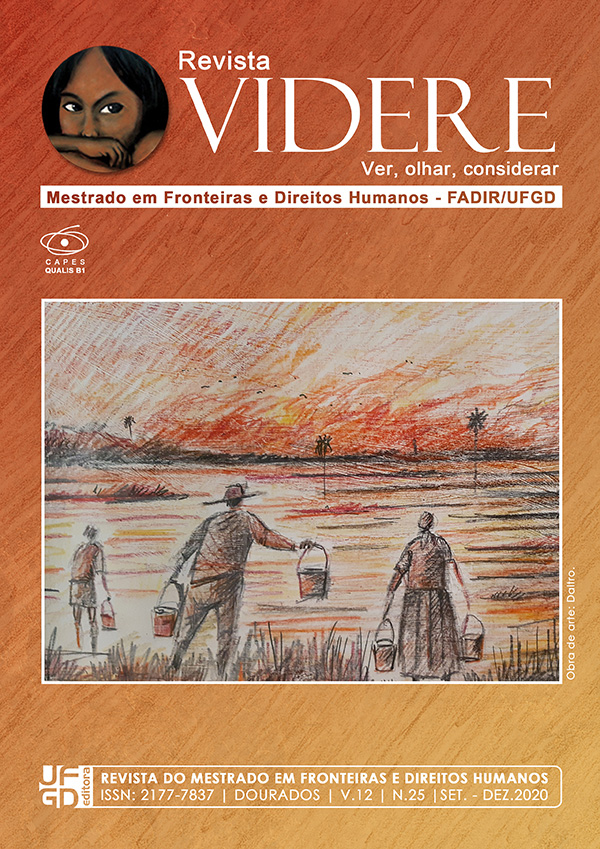Vulnerability of people who live on the street and pandemic of Covid - 19: social isolation or (in) human visibility
DOI:
https://doi.org/10.30612/videre.v12i25.11520Keywords:
Social isolation. Fundamental rights. COVID-19 pandemic. Constitutional right.Abstract
This essay analyzes the condition of people on the streets and fundamental rights from the perspective of Constitutional Law from the pandemic of COVID-19. The work aims to reflect on the condition of people living on the streets, based on the prevention policy disseminated by public agencies, specifically the recommendation of the World Health Organization (WHO) for effective social isolation. In the research, the qualitative method stands out, which starts from subjective aspects to demonstrate the emphasis on normative elements of justice, considering the analysis of the author's data (elaboration based on the estimate of data collected in the city of Manaus- AM, 2020). As a research problem, we have: are people on the street excluded from prevention and social isolation policies in the face of the COVID-19 pandemic?Downloads
References
BONAVIDES, Paulo. Ciência política. 10. ed. São Paulo: Malheiros, 1997.
BRASIL. Decreto nº 7053 de 23 de dezembro de 2009. Institui a Política Nacional para população em situação de rua e seu comitê Intersetorial de Acompanhamento e Monitoramento, e dá outras providências. Disponível em: www.presidencia.gov.br. Acesso em: 2 jun. 2020.
BRASIL. Instituto de Pesquisa Econômica Aplicada – IPEA. Estimativa da população em situação de rua no Brasil (setembro de 2012 a março de 2020). Nº 73. Junho, 2020a. Disponível em: http://repositorio.ipea.gov.br/bitstream/11058/10074/1/NT_73_Disoc_Estimativa%20da%20populacao%20em%20situacao%20de%20rua%20no%20Brasil.pdf. Acesso em: 2 jun. 2020.
BRASIL. Ministério da Saúde. Painel Coronavírus. Junho, 2020b. Disponível em: https://covid.saude.gov.br/. Acesso em: 2 jun. 2020.
MORAES, José Roberto de. Prerrogativas processuais da Fazenda Pública. In: SUNDFELD, Carlos Ari; BUENO, Cassio Scarpinella (coords.). Direito processual público: a Fazenda Pública em juízo. São Paulo: Malheiros, 2000.
ONU. Assembleia Geral da Organização das Nações Unidas. Declaração Universal dos Direitos Humanos, Nações Unidas, 217 (III) A, 1948, Paris.
PARANÁ. Ministério Público. Fique em casa: o isolamento social e a situação de rua. 18 jun. 2020. Disponível em: http://www.mppr.mp.br/2020/06/22682,15/Fique-em-casa-o-isolamento-social-e-a-situacao-de-rua.html. Acesso em: 23 jun. 2020.
PIOVESAN, Flávia. Proteção dos direitos sociais: desafios do iuscommune sul-americano. Revista de Estudos Constitucionais, Hermenêutica e Teoria do Direito – RECHTD, v. 3, n. 2, dez. 2012. Disponível em: http://revistas.unisinos.br/index.php/RECHTD. Acesso em: 23 maio 2020.
REVISTA ISTO É. Estacionamento de Las Vegas vira área para proteger sem-teto da COVID-19. 31 mar. 2020. Disponível em: https://istoe.com.br/estacionamento-de-las-vegas-vira-area-para-proteger-sem-teto-da-covid-10/. Acesso em: 23 jun. 2020.
TRINDADE, Antônio Augusto. A questão da implementação dos direitos econômicos, sociais e culturais: evolução e tendências atuais. Revista Brasileira de Estudos Políticos, 1999.
TRINDADE, Antônio Augusto. Tratado de Direito Internacional dos Direitos Humanos. Porto Alegre: Fabris, 1991.
VASAK, Karel. A 30-year struggle: the sustained efforts to give for of law to the Universal Declaration of human Rights. The Unesco Courier: Paris, 1997.
Downloads
Published
How to Cite
Issue
Section
License
Authors must accept the publication rules when submitting the journal, as well as agree to the following terms:
(a) The Editorial Board reserves the right to make changes to the Portuguese language in the originals to maintain the cultured standard of the language, while respecting the style of the authors.
(b) Authors retain the copyright and grant the journal the right to first publication, with the work simultaneously licensed under the Attribution-NonCommercial-ShareAlike 3.0 Brazil (CC BY-NC-SA 3.0 BR) that allows: Share - copy and redistribute the material in any medium or format and Adapt - remix, transform, and create from the material. CC BY-NC-SA 3.0 BR considers the following terms:
- Attribution - You must give the appropriate credit, provide a link to the license and indicate whether changes have been made. You must do so under any reasonable circumstances, but in no way that would suggest that the licensor supports you or your use.
- NonCommercial - You may not use the material for commercial purposes.
- Sharing - If you remix, transform, or create from material, you must distribute your contributions under the same license as the original.
- No additional restrictions - You may not apply legal terms or technological measures that legally restrict others from doing anything that the license permits.
(c) After publication, authors are allowed and encouraged to publish and distribute their work online - in institutional repositories, personal page, social network or other scientific dissemination sites, as long as the publication is not for commercial purposes.



















